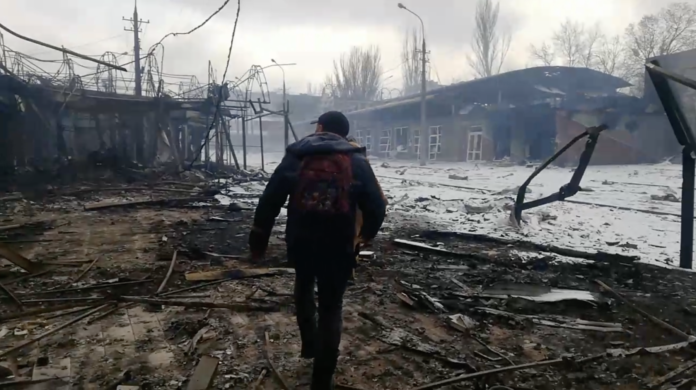The bus pulled into the mall parking lot and stopped near the gas station, beneath the golden arches of a McDonald’s sign.
The driver opened the trunk and loaded in the suitcases and strollers of the families making the two-hour drive into exile.
It took them days to get to Lviv, Ukraine, from Mariupol, the city described as a “freezing hellscape” of bodies and ruined buildings.
As she waited to board the bus, Daria said she was taking her son Platon to Spain. Born on the first day of the Russian invasion, he slept in her arms, a month-old but yet to live in peace.
(Global News is not using full names for safety reasons.)
Like the others with seats on the Mercedes bus to Poland, Daria was from Mariupol, the port city on the Sea of Azov that is surrounded by Russian forces.
Unable to capture it, Russian troops have instead been razing it, committing what the European Union and United States have called war crimes.
The maternity hospital and the theatre where civilians once took shelter were bombed, killing hundreds.
Photos and videos shared with Global News by residents showed the blackened ruins of an apartment block, and the skeletons of buildings and cars.
Up to 90 per cent of buildings have been damaged or destroyed. President Volodymyr Zelenskyy said there was nothing left in Mariupol, “only ruins.”
Daria, left, says goodbye to family before boarding a bus to Poland with her one-month-old son.
Stewart Bell/Global News
Asked to describe the city, Daria began to sob. Once she composed herself, she said there was no gas and they could only eat what was in the pantry.
With no running water, they had to venture outside to the sewers to collect it. Humanitarian help was non-existent, she said.
A nine-story building was gutted, with no windows left, she said. There were tanks moving in the city. She had to get out.
She left town in a friend’s car, during an unofficial “green corridor,” when Russia had signaled they might not open fire on those trying to escape.
Before boarding the bus that would take her to the Ukraine-Poland border, she said a final goodbye to her family. They were staying behind. She remembered it was her birthday.
Trending Stories
Mitch McConnell says he cannot support Jackson for U.S. Supreme Court
Foo Fighters drummer Taylor Hawkins dead at age 50, band says
Russian forces seek a land corridor along Ukraine’s southern coast, and capturing Mariupol is vital to their strategy. The cruel, persistent bombardment of the city has made it emblematic of the war.
After failing to capture the city from Ukrainian forces, Russian troops resorted to besieging and destroying it with shells and missiles.
A senior U.S. defence official said Friday that “vicious fighting” was continuing in Mariupol as well as long-range strikes, “so lots of heavy fighting there.”
Estimates of the civilian death toll are as high as 3,000, and the United Nations said there were reports of mass graves. Just half the city’s population of 400,000 remains.
Human Rights Watch said residents who vacated the city had spoken of sheltering in basements with little or no access to water, power, heat, medical care or phone service.
“And these are the lucky ones who were able to escape, leaving behind thousands who are cut off from the world in the besieged city,” said Belkis Wille, a senior researcher at the rights group.
Galuna, in the red coat, says goodbye to her family before boarding the bus to Poland, March 26, 2022.
Stewart Bell/Global News
Galuna’s family lived near the hospital. She said the morgue was overflowing. They stayed in the basement for three weeks.
“There was nothing left but scorched earth. Just hell that burns again and again,” she said.
They fled the city in a three-car convoy. They drove so fast they got into an accident with another vehicle.
Her niece Khristina was injured, but they carried on to Dnipro, Zaporizhzhia and Lviv, where they met up with the bus to Poland, which was organized by Canadian military veterans.
“We are leaving everything. Our city, our hearts,” Khristina said. She had a black eye and a bandage around her head from the car crash.
“We still have relatives there and we don’t know how they are,” she added. “Help us please. Give us at least some weapons.”
Ruined car in Mariupol, in a photo provided by a refugee who fled the city.
Handout
As the 9 a.m. departure time came and went, Galuna and her husband clung to each other beside the bus doors. She put her head on his shoulder.
She was leaving for Almeria, Spain, and he was staying behind with their two sons “to protect the land.”
Galuna said she asked them to rid Ukraine of the “horrible people” who had invaded it.
The doors closed and the driver steered for Poland.
© 2022 Global News, a division of Corus Entertainment Inc.



